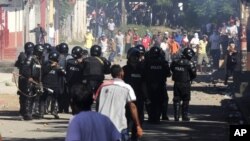Nicaragua’s governing Sandinista party has strengthened its control over the Central American nation, winning an overwhelming number of local elections in voting November 4. Election monitors from the Organization of American States noted some problems with voting lists, but said the polling took place in an “atmosphere of civility” amid low turnout. Complaints by others, however, have raised concerns that practices that marred previous elections continue to stifle the will of the Nicaraguan people.
The Supreme Electoral Council reported that the Sandinista party won 134 of 153 mayoral posts. A fragmented opposition divided the rest. Fighting broke out in some areas in clashes between supporters of President Daniel Ortega and opponents, with three people reported killed. Ortega was re-elected last year amid similar protests after the Nicaraguan Supreme Court, dominated by the president’s appointees, overturned a ban on consecutive terms.
The United States is concerned that Sunday’s elections failed to demonstrate a degree of transparency that would assure Nicaraguans and the international community that the process faithfully reflected the will of the Nicaraguan people.
There were widespread complaints about the partisan manner in which the electoral council managed preparations for the vote and the council's conduct on Election Day. Voting irregularities included citizens being denied the right to vote, failure to respect the secrecy of citizens’ votes and reported cases of voters being allowed to vote multiple times. Similar complaints have been raised in many recent Nicaraguan elections.
We again urge the Nicaraguan government to implement the recommendations that the European Union and OAS electoral missions made following the flawed 2011 elections, and to uphold its commitment to representative democracy under the OAS and Inter-American Democratic charters.
The Supreme Electoral Council reported that the Sandinista party won 134 of 153 mayoral posts. A fragmented opposition divided the rest. Fighting broke out in some areas in clashes between supporters of President Daniel Ortega and opponents, with three people reported killed. Ortega was re-elected last year amid similar protests after the Nicaraguan Supreme Court, dominated by the president’s appointees, overturned a ban on consecutive terms.
The United States is concerned that Sunday’s elections failed to demonstrate a degree of transparency that would assure Nicaraguans and the international community that the process faithfully reflected the will of the Nicaraguan people.
There were widespread complaints about the partisan manner in which the electoral council managed preparations for the vote and the council's conduct on Election Day. Voting irregularities included citizens being denied the right to vote, failure to respect the secrecy of citizens’ votes and reported cases of voters being allowed to vote multiple times. Similar complaints have been raised in many recent Nicaraguan elections.
We again urge the Nicaraguan government to implement the recommendations that the European Union and OAS electoral missions made following the flawed 2011 elections, and to uphold its commitment to representative democracy under the OAS and Inter-American Democratic charters.




